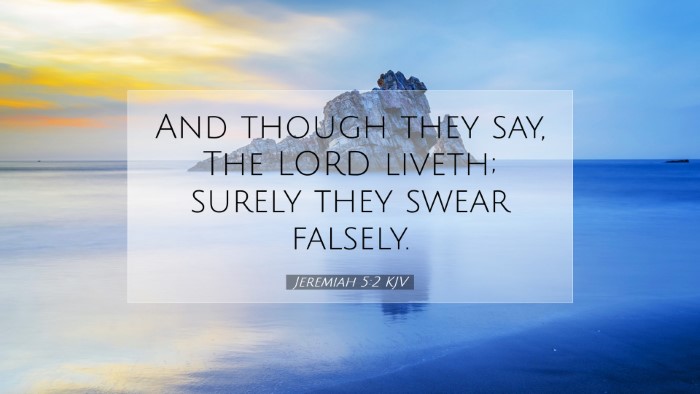Commentary on Jeremiah 5:2
Jeremiah 5:2 states: "And though they say, The LORD liveth; surely they swear falsely." This verse serves as a powerful indictment against the people of Judah, exposing the discrepancy between their outward profession and their inner reality.
Overview of the Context
The book of Jeremiah unfolds during a time of impending judgment against Judah due to the persistent sin of its people, particularly their idolatry and failure to uphold true worship. In this context, Jeremiah is called to confront the unfaithfulness of the nation and to call them back to repentance.
Commentary Insights
Matthew Henry
Matthew Henry emphasizes the duplicitous nature of the people, stating that their outward confession of faith ('The LORD liveth') contrasts starkly with their actions, which fail to reflect a genuine relationship with God. He notes that swearing falsely denotes a serious breach of integrity which points to the spiritual blindness pervasive in Judah. Henry suggests that despite their claims of loyalty to God, their behavior reveals a heart that is far from Him. He expresses that true faith must be accompanied by righteous living.
Albert Barnes
Albert Barnes gives a detailed analysis of the implications of the phrase 'surely they swear falsely.' He stresses that Judah’s hypocrisy is highlighted here; their acknowledgment of the Lord's existence is empty and devoid of truth. Barnes draws attention to the severity of false swearing in the Old Testament context, as it constitutes a breach of covenantal faithfulness. He points out that the Lord requires truth in the inward parts (Psalm 51:6) and that external observances without internal reality are meaningless. Barnes encourages readers to reflect on their own lives, ensuring that their declarations of faith are substantiated by living out the implications of that faith.
Adam Clarke
Adam Clarke brings perspective to the nature of the accusation made by the Lord through Jeremiah. He highlights that in this passage, the Lord is searching for sincerity and truthfulness among His people. Clarke indicates that the phrase 'The LORD liveth' was often an expression of an oath; thus, their empty declarations point to a cultural and religious malaise. Clarke provides theological insights into God's desire for sincere worship that aligns with our statements. He warns against the dangers of a hollow faith and urges believers to continually seek authenticity in their relationship with God.
The Theological Implications
The theological implications of Jeremiah 5:2 draw profound lessons about the nature of true worship and the seriousness of spiritual integrity. The verse not only highlights the tension between profession and practice but also points to God’s unwavering demand for truthfulness and fidelity in worship.
- Hypocrisy in Worship: The verse serves as a cautionary tale about the dangers of religious hypocrisy. It challenges individuals in their communities to evaluate whether their expressions of faith align with their actions.
- The Nature of God’s Justice: The context of impending judgment illustrates God’s justice and His response to covenant unfaithfulness. It depicts God as one who sees through the facade and calls His people to account.
- Call to Authenticity: Authenticity in faith is paramount. This passage invites reflection on personal integrity and the sincerity of one's relationship with the Lord.
Practical Applications
For pastors, theologians, and students of the Bible, Jeremiah 5:2 provides rich material for reflection and application:
- Encouraging Sincerity in Ministry: Leaders are reminded to foster authentic expressions of faith within their congregations, encouraging members to live in congruence with their verbal professions.
- Teaching on the Importance of Righteous Living: This verse can serve as a basis for teaching the necessity of aligning one’s lifestyle with the teachings of Scripture.
- Promoting a Culture of Accountability: It emphasizes the importance of accountability among believers to support one another in maintaining a truthful and sincere faith walk.
Conclusion
Jeremiah 5:2 encapsulates a profound truth about the nature of authentic faith and God's expectations from His people. By recognizing the pitfalls of hypocrisy and the importance of aligning one's inner beliefs with outward expressions of worship, believers can cultivate a deeper, more meaningful relationship with God. The insights from commentators like Henry, Barnes, and Clarke enrich our understanding and challenge us to reflect on our devotion to the Lord, our practices, and the integrity we uphold within our church communities.


